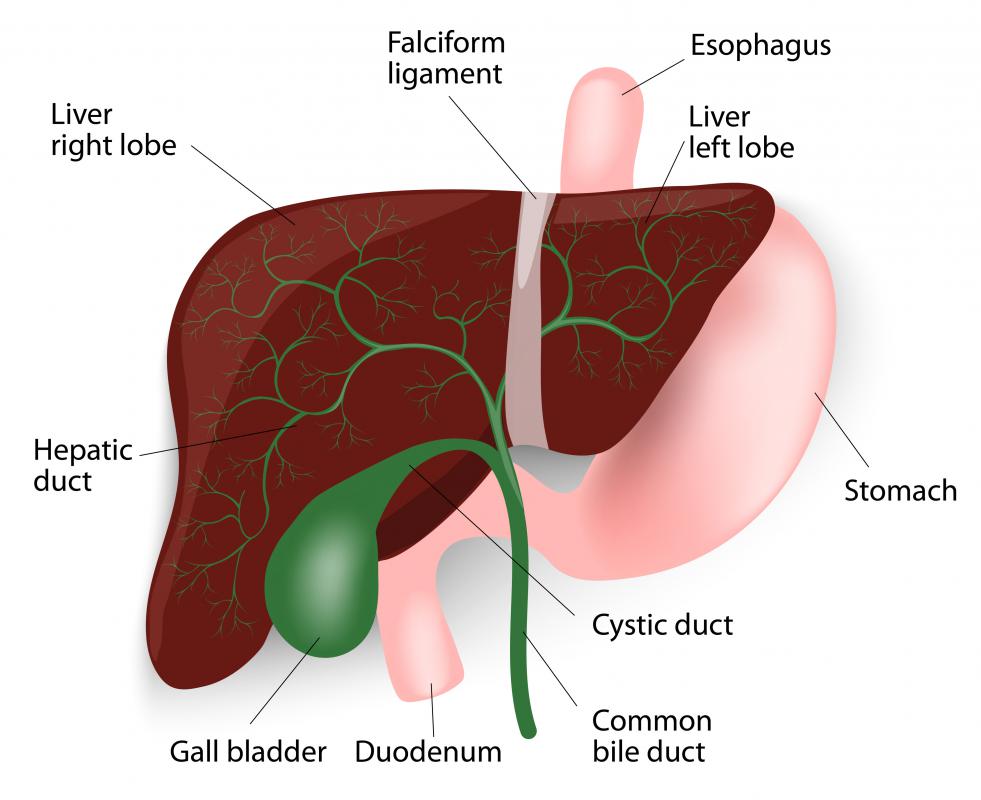At WiseGEEK, we're committed to delivering accurate, trustworthy information. Our expert-authored content is rigorously fact-checked and sourced from credible authorities. Discover how we uphold the highest standards in providing you with reliable knowledge.
What Is Enterogastrone?
An enterogastrone is a hormone produced in the duodenum of the intestinal tract to facilitate certain digestive processes. These hormones respond to environmental factors like the presence of chyme, partially digested food that contains an assortment of lipids and other molecules along with secretions like bile. It is possible to measure enterogastrone levels in a patient with a digestive disorder to learn more about the origins of the disorder and how it impacts the patient's digestion. Blood testing as well as direct testing through endoscopic procedures is available for different medical applications.
The cells that produce these hormones are located in the duodenal wall, and have receptors that lock onto various components of chyme. Some examples of enterogastrones include cholecystokinin and secretin. Levels of various hormones can fluctuate in response to changing conditions inside the duodenum, and tend to increase during digestion while falling off at other times because the digestive tract is less active during these periods.

One thing an enterogastrone can do is produce alkaline conditions to counteract acids in the duodenum. These hormones can also cut down on secretions of bile and other compounds by signaling other cells in the digestive tract. Some reduce motility, while others may communicate to trigger the production and release of hormones like insulin. Digestion is an extremely complex, multiphase process that involves scores of signals from hormones like the enterogastrones.

Some of the enterogastrone hormones were among the earliest identified and defined by medical researchers. Study of the digestive tract revealed the nature of relationships between different hormones, enzymes, and other compounds and illustrated how they interacted to promote digestion. This research also helpfully showed what happens when patients have congenital disorders that disrupt the production of key enzymes and hormones, changing the way they digest food.

Errors in digestion can sometimes be the result of increased or decreased hormone production. If a doctor suspects a hormone imbalance, the patient may need some tests to learn more. These can include fasting tests to detect levels after a period of not eating, as well as challenge tests after eating to see how the levels change. Doctors can also introduce enterogastrone hormones to the patient in testing to see how the body responds to them, to determine if a disorder is caused by insensitivity to a particular hormone or to trigger an event like the release of bile to see how the patient's biliary tract behaves.
AS FEATURED ON:
AS FEATURED ON:














Discussion Comments
I wonder if taking something like a probiotic on a regular basis would help keep the enterogastrone hormones balanced?
I know once I started eating some yogurt every day, and taking a natural probiotic supplement, I really had a lot of improvement in my digestion problems.
Making sure we take enzymes is also another way to keep a healthy digestive system. Many of our foods don't get digested all the way, and the right enzymes can help keep us healthy.
With enterogastrone being a hormone, it is really important for this to be balanced in our bodies. We have a lot of different hormones, and when they are not balanced, it affects our whole well being.
The digestive system is certainly no exception here. I know when I don't eat right and have digestive problems I am absolutely miserable.
Sometimes it is a matter of eating something that disagrees with you, but many other times there is an ongoing problem.
At one point when I was having a lot of digestive pain, I had an endoscopy performed to find out what was causing it.
It showed that I had chronic gastritis and started on some medication to help this heal. I still watch what I eat and know there will always be certain fatty foods that I need to avoid.
Enterogastrone is exactly why we should include healthy fats in our diet. Generally when people are trying to lose weight, they stop having fats which actually makes them feel fuller longer because of enterogastrone. When we don't have anything with fat, we are hungrier faster and end up snacking more. This makes us intake more calories.
I have done this myself many times. But after I learned about enterogastrone and other digestive hormones, I make sure to include enough fats in my diet and I have benefited a lot from it.
Our body and system is so unique, it does everything so well and there is a purpose for everything in it. I feel like the more I understand about how it works, the better I can use it to my advantage and keep myself healthy.
@ysmina-- Enterogastrone assists in the digestion of fats by slowing down food particle with fats (lipids) in them while they enter the duodenum. Fat takes a long time to digest, the stomach and intestines need more time to digest them than they do for sugars and carbohydrates. So by slowing down this process, enterogastrone makes the digestion of fats possible.
Enterogastrone does this by slowing down the stomach as well. Acid tends to help food move through the stomach into the intestines. Entegastrone reduces acid production so that food doesn't move through as quickly.
I need to answer a question about this for my homework. It's asking me the role of enterogastrone in the digestion of fats.
What role does enterogastrone play in this?
Also, I know that duodenum is the entry section of the small intestine and this is where enterogastrone is released.
Does enterogastrone impact the stomach at all then?
Post your comments